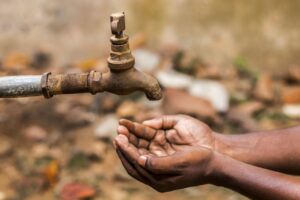COVID-19:Water is essential for public health
Containing the COVID-19 virus is a global public health challenge.

According to the World Health Organization (WHO), frequent and thorough hand washing can help reduce your chances of contracting infectious diseases such as COVID-19.
But it is hard to wash your hands if you don’t have access to clean water – and worldwide 780 million people do not have access to an improved water source.[1] In 2017, poor sanitation and limited access to hand-washing facilities contributed to around 1.5 million deaths worldwide. In the least developed countries, 22% of health care facilities have no water service, 21% no sanitation service, and 22% no waste management service.[2]
The pandemic has devastated the lives of poor people across the developing world. COVID-19 threatens to hit the world’s poorest nations disproportionately, the United Nations has warned, not just as a health crisis but as a social and economic crisis for billions of people in the months and years to come.
The UN Development Program expects income losses to exceed $220 billion in developing countries as economic shutdowns linked to the coronavirus bite, and nearly half of all jobs in Africa could be lost.
Exacerbating the crisis is climate change which primarily impacts the water cycle. UN Secretary General, Antonio Guterras has noted that 40% of the world’s people are affected by water scarcity and more than 90% of disasters are water-related.
Water scarcity is a global problem that needs collective action. There is no more urgent a time to address the world’s water crisis than now, when people are constantly being reminded to use water to combat the spread of the virus.
Key to addressing water scarcity is improved water management. We must ensure sustainable and equitable water for all, if we are to stem future crises. Finding the balance in allocations between agriculture, industry and growing urban centres while protecting the environment is an ongoing activity for governments, and hydrological models remain a vital tool, particularly when it comes to predictions of the future.
eWater was established by Australian Federal and State governments to provide watermodelling tools, technical support and capacity building in Australia and internationally. eWater works with DFAT, the World Bank, Asian Development Bank, the Mekong River Commission, and a range of government water authorities across the Indo-Pacific to help manage water better with a view to providing reliable water supply and sanitation for rural and urban communities to improve health and wellbeing for all.
In restricting the spread of the COVID-19 virus and in adapting to climate change, improved water management is critical and must be given higher priority.
[1] World Health Organization (WHO) and UNICEF. Progress on Drinking Water and Sanitation: 2012.
[2] WHO Fact Sheet: Drinking Water June 2019